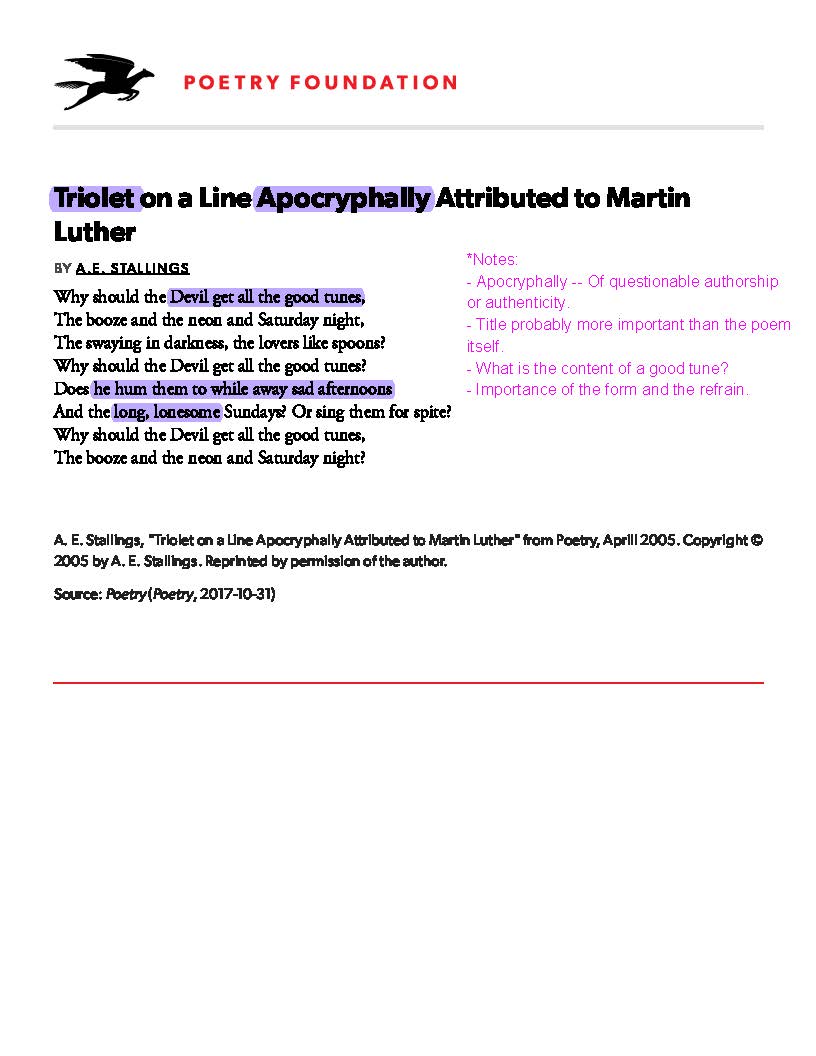Poem found here: "Triolet on a Line Apocryphally Attributed to Martin Luther" by A E Stallings
This is a tough poem. But a tougher title.
The Poem
The poem itself, without the title, is a fun set of rhetorical questions in the triolet. So why this form for this poem. There's a certain rhythm and song like quality to this poem based on the rhyme scheme
"ABaAabAB" which the 1st, 4th, and 7th lines are the same word "tunes" as well as the 2nd, and lst line of "night." These are the main concepts of the poem -- or at least stand out the most."Why should the Devil get all the good tunes, / The booze and the neon and Saturday night," Ah, the luxury of sin on a Saturday night. This makes me think of the type of music found in clubs and night life -- a more fast paced, open energy: dance, disco, electronic, drum and bass. I'm trying to listen to the songs now, and just imagine being lost in the beat.
Then this line appears and the first rhetorical question appears, "The swaying in darkness, the lovers like spoons?" There's a sense of intimacy in the darkness. This neutralizes a "sense of evil" associated with the devil and more the "sense of light sin" a light fun. I changed to La Bouhce, "Be My Lover" now
"Why should the Devil get all the good tunes?" I wonder, with this repetition, the question should be taking with more seriousness? I wonder if that works the same way in songs as well. Again the next two lines confirms the tone of the piece, "Does he hum them while away sad afternoons / And the long, lonesome Sundays? Or sing them for spite?"
I'm assuming the "he" here refers to the Devil (uppercase, so the actual manifestation) what harm is he doing? There's a certain relatable longing that is attributed which stands out more because of the alliteration "l sounds -- like hell" and the idea if spit is in there, but seems like an aside a lessened in severity, "sing them for spite?"
I changed to Snap!, "Rhythm is a Dancer"
The repetition at the end of the poem, "Why should the Devil get all the good tunes, / The booze and the neon and Saturday night?" brings the light hearted tone at the end. The rhetorical questioning device seems more like a shrug -- a light hearted push against debauchery.
The Title
"Triolet"
Why announce the form first. It's that important to the poem. So important that the words come secondary. That's right, the poem is just words. The meaning starts on deciphering a) what triolet means in the context to the poem, the allusions, and the content.
"on a line Apocryphally attributed to"
Misinformation. The phrase wasn't said by the person, therefore how strong is the statement without the person behind it.
"Martin Luther"
Who? It is not Martin Luther King like my first thought was. It's Martin Luther. How would someone know this? Well, the poet made a gamble. The gamble was a) someone would know this quote and know who said it or b) someone would take the time to look this up based on the construction and quality of the poem.
I am b.
I am also sitting in silence now.
I think this blog details out the misusage of the statement: "Luther: Why should the Devil Have All the Good Music?"
Now this is where the title shifts the context of the poem a bit. Perhaps instead of going against. Why can't there be good Christian music at the same level of appeal as "rotten, lifeless stuff." In an ironic sense the poem plays with the idea that one side is against the other.
The first song that comes to mind is Flyleaf, "All Around me." Not a Saturday night banger, but something with life, but not as rotten.
So here's the last rhetorical question: does the content of the song make it a good tune? does the content of a poem connect because of the form or is the form hindering it?
In music, maybe the message is secondary. The rhythm, the music, and the beats are more important and how it's utilized.

Comments
Post a Comment